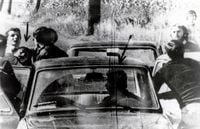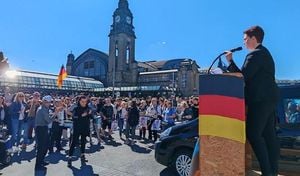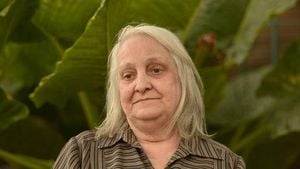Alberto Franceschini, a pivotal figure in Italy's radical leftist history, passed away at the age of 78. The news of his death, which occurred on April 11, 2025, in Milan, was made public on April 26, 2025. Franceschini was one of the founding members of the Brigate Rosse (Red Brigades), an organization that became notorious for its violent actions during Italy's Years of Lead, a period marked by political turmoil and terrorism.
Born on October 25, 1947, in Reggio Emilia, Franceschini hailed from a family steeped in communist tradition. His father, Carlo, was arrested for anti-fascist activities during Mussolini's regime, and his grandfather was among the founders of the Communist Party of Italy in 1921. This background deeply influenced Franceschini's political trajectory, leading him to join the Federazione Giovanile Comunista Italiana (Federation of Young Italian Communists) at a young age.
In September 1970, he, along with Renato Curcio and Mara Cagol, founded the Brigate Rosse. Their first guerrilla action took place on September 17, 1970, when they set fire to the garage of Giuseppe Leoni, the personnel director of Sit Siemens, in Milan. This marked the beginning of a violent campaign that would define Franceschini's life for years to come.
Franceschini entered a life of clandestinity in February 1971, becoming the first officially wanted member of the Brigate Rosse. Three years later, he played a crucial role in the kidnapping of Judge Mario Sossi, who was abducted in Genoa on April 18, 1974, and released on May 23 of the same year. Judge Guido Salvini noted that "Franceschini was the one who facilitated Sossi's release and never directly committed acts of bloodshed." However, Franceschini was later convicted for his involvement in the murder of two MSI (Italian Social Movement) members in Padova on June 17, 1974, which further solidified his reputation as a key player in Italy's leftist terrorism.
His criminal activities led to a conviction of over sixty years in prison on charges including double murder, forming an armed gang, and kidnapping. However, his sentence was later reduced. Arrested in September 1974 alongside Curcio, Franceschini spent years in various special prisons, where he remained an active member of the Brigate Rosse.
By 1982, Franceschini began to distance himself from the armed struggle, expressing remorse for his actions. He publicly dissociated himself from the Brigate Rosse, a move that was deemed sincere by observers. His transition away from violence included working with Arci, a social cooperative focused on aiding immigrants, the unemployed, and at-risk youth. He also served tables in Milan, reflecting a significant life change from his earlier days of radicalism.
Franceschini's life took a more reflective turn after his release from prison in 1992, when he was finally free after serving 18 years. He worked on various social projects, helping marginalized communities. His past, however, continued to haunt him, as he was identified in 2024 at a commemoration for Alexei Navalny in Milan, stirring controversy and discussions about his legacy.
In the years following his release, Franceschini published several works detailing the history of the Brigate Rosse and his experiences. In a notable 1988 book titled "Mara, Renato e io. Storia dei fondatori delle Br," co-authored with Pier Vittorio Buffa and Franco Giustolisi, he explained the motivations behind the group's escalation of violence, particularly their decision to target prominent political figures like Aldo Moro, shifting focus from earlier targets such as Giulio Andreotti.
Despite his past, Franceschini's later years were marked by attempts to reconcile with his history. In 2002, he met with Silvano Girotto, who had helped orchestrate his arrest nearly thirty years earlier. This meeting symbolized a significant shift in Franceschini's perspective on his past and the violent legacy of the Brigate Rosse.
Franceschini's death marks the end of an era for many who followed Italy's tumultuous political landscape during the 1970s and 1980s. His life story encapsulates the complexities of political ideology, the impact of radicalism, and the potential for change and redemption. As Italy reflects on its history, figures like Franceschini serve as reminders of the consequences of political extremism and the difficult paths toward reconciliation.





